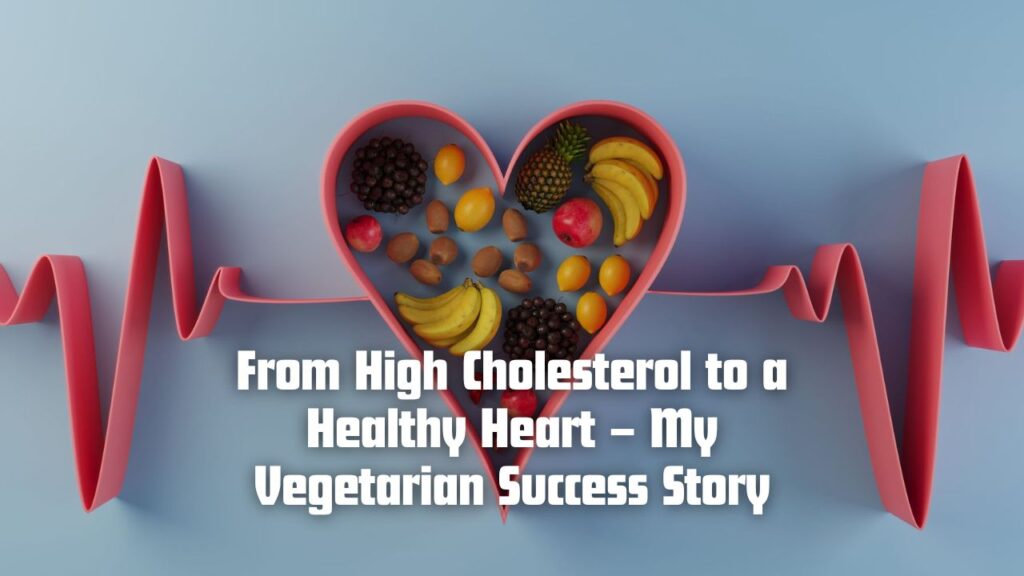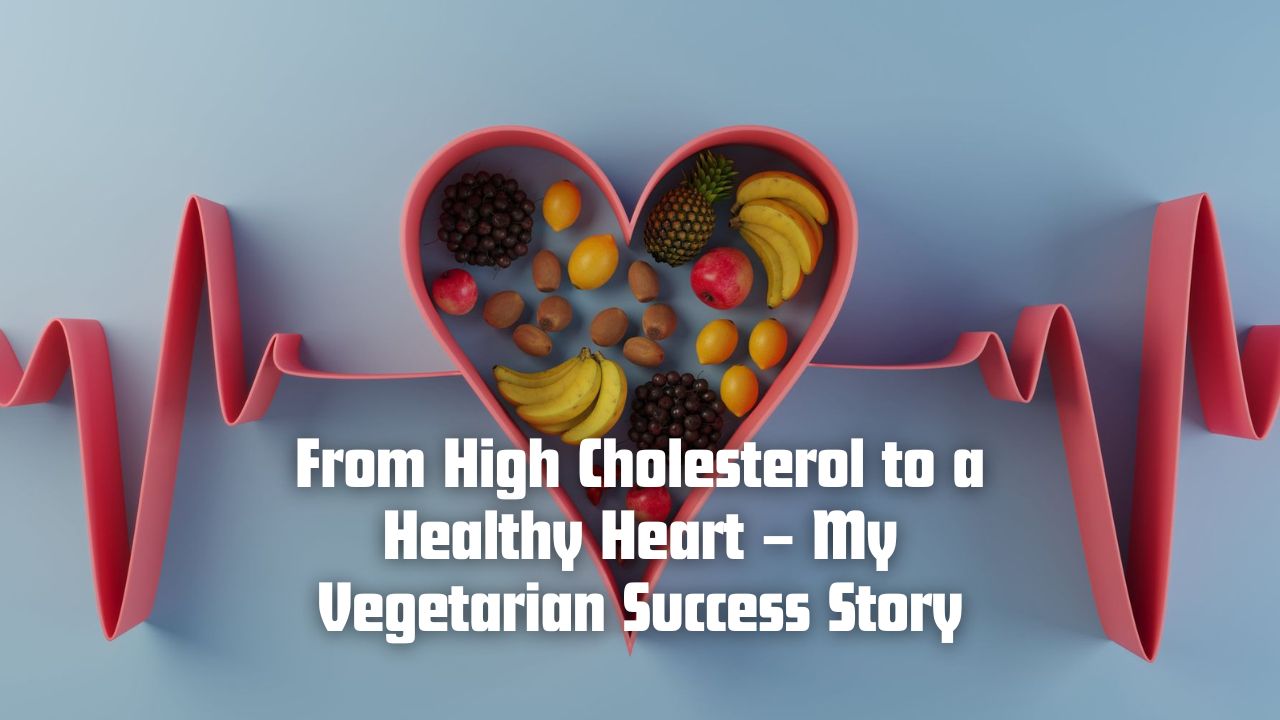From High Cholesterol to a Healthy Heart – My Vegetarian Success Story
A few years ago, my health was in danger. I was diagnosed with high cholesterol, and my doctor warned me about the risks. I was at risk of heart disease, stroke, and other serious problems. I was shocked because I thought I was eating a normal diet. But my body was telling me otherwise.
I had two choices: take medications for life or make a lifestyle change. I chose the second option. I decided to try a vegetarian diet and improve my eating habits. This is my journey from high cholesterol to a healthy heart—a story of how food changed my life.
The Shocking Health Report
One day, during a routine health checkup, my doctor looked concerned. My cholesterol levels were too high. LDL (bad cholesterol) was way above normal, and my HDL (good cholesterol) was low. This was a serious health risk.
The doctor explained that high cholesterol can lead to heart attacks, blocked arteries, and even sudden cardiac arrest. He asked about my diet and lifestyle. I realized I was eating too much fried food, processed snacks, and red meat. I also had very little exercise in my daily routine.
I was scared. I didn’t want to depend on medicines forever. So, I asked my doctor if there was a natural way to reduce cholesterol. He suggested that I try a plant-based diet, exercise regularly, and reduce stress.
Why I Chose a Vegetarian Diet
At first, the idea of going vegetarian was difficult. I loved meat, fast food, and dairy products. But after researching, I found that a plant-based diet can lower cholesterol, improve heart health, and increase energy levels.
Vegetables, fruits, whole grains, nuts, and legumes are rich in fiber and help remove excess cholesterol from the body. Also, vegetarian foods have no saturated fats that are found in meat and dairy.
I also learned that a vegetarian diet is good for the environment and reduces the risk of many chronic diseases like diabetes and high blood pressure. This gave me the motivation to start my journey toward better health.
Making the Switch – My First Steps
The first few days were tough. I had cravings for my favorite junk food. But I made a plan to replace unhealthy food with nutritious meals.
- Instead of fried snacks, I ate nuts and seeds.
- I replaced white rice with brown rice and quinoa.
- I started drinking smoothies instead of sugary drinks.
- I added leafy greens, beans, and tofu to my meals.
I also started reading food labels to avoid products with high cholesterol, trans fats, and artificial additives. Within a few weeks, my energy levels improved, and I felt lighter and healthier.
The Importance of Exercise
Changing my diet was a great first step, but I knew that I also needed to exercise. My doctor recommended at least 30 minutes of exercise every day.
I started with walking and slowly included jogging, yoga, and strength training. Exercise helped improve my blood circulation, burn fat, and lower my cholesterol levels.
Regular physical activity also helped me reduce stress. Stress can increase blood pressure and cause heart disease. So, I practiced deep breathing, meditation, and mindfulness to keep my mind calm.
By combining a healthy diet and regular exercise, I started seeing big improvements in my health.
The Power of Natural Remedies
Along with my vegetarian diet, I included some natural home remedies to help lower my cholesterol. Some of the best foods for heart health are:
- Garlic – Helps lower bad cholesterol.
- Turmeric – Reduces inflammation and improves heart function.
- Green Tea – Rich in antioxidants that lower LDL cholesterol.
- Oats – Full of fiber, which removes extra cholesterol from the body.
- Flaxseeds – High in omega-3 fatty acids, which are great for the heart.
These simple foods became a part of my daily diet. They helped me feel better and improved my overall health.
The Results – My Health Transformation
After three months of following a vegetarian diet and exercising regularly, I went for a medical check-up. The results were amazing!
- My LDL (bad cholesterol) dropped significantly.
- My HDL (good cholesterol) increased.
- My blood pressure became normal.
- I lost weight and felt more energetic.
The doctor was impressed. He told me that if I continued this lifestyle, I could avoid heart disease and live a long, healthy life.
This was a proud moment for me. I realized that food is medicine. By eating the right foods, I healed my body naturally.

How a Vegetarian Diet Saves Money
A vegetarian diet not only improved my health but also helped me save money. Many people think healthy eating is expensive, but I found ways to make it affordable.
- Fruits and vegetables are cheaper than meat and processed food.
- Buying beans, lentils, and grains in bulk reduces costs.
- Home-cooked meals are cheaper than restaurant food.
- Less money spent on medicines and doctor visits.
By switching to a plant-based diet, I saved a lot on my grocery bills and medical expenses. It was a win-win situation!
How a Healthy Lifestyle Benefits My Family
My health transformation inspired my family to eat healthier. My kids started enjoying fruits, nuts, and whole grains instead of junk food. My spouse also reduced meat and dairy intake.
We started cooking together and trying new vegetarian recipes. Eating fresh, natural food brought us closer as a family. We also became more active, going for walks, bike rides, and outdoor activities.
A healthy lifestyle not only improves physical health but also strengthens family bonds.
Final Thoughts – A New Life with a Healthy Heart
My journey from high cholesterol to a healthy heart was life-changing. I realized that small changes in diet and lifestyle can have a big impact.
Switching to a vegetarian diet, exercising, and following natural remedies helped me reverse my cholesterol problem. Today, I feel stronger, more active, and full of life.
If you are struggling with high cholesterol or heart problems, I encourage you to try a healthier lifestyle. Take small steps, stay consistent, and see the amazing benefits.
FAQs – From High Cholesterol to a Healthy Heart – My Vegetarian Success Story
1. What made you switch to a vegetarian diet?
I switched to a vegetarian diet after my doctor diagnosed me with high cholesterol. I wanted to avoid long-term medications and naturally improve my heart health.
2. How does a vegetarian diet help lower cholesterol?
A vegetarian diet is rich in fiber, which helps remove excess cholesterol from the body. It is low in saturated fats found in meat and dairy, reducing the risk of heart disease.
3. What foods did you avoid to reduce cholesterol?
I avoided red meat, processed foods, fried snacks, full-fat dairy, and sugary drinks. These foods contain trans fats and saturated fats, which raise bad cholesterol (LDL) levels.
4. What foods did you add to your diet?
I included leafy greens, oats, nuts, flaxseeds, legumes, whole grains, fruits, and olive oil. These foods help lower LDL cholesterol and increase good cholesterol (HDL).
5. Did you take any natural remedies to improve heart health?
Yes, I added garlic, turmeric, green tea, and flaxseeds to my diet. These foods have anti-inflammatory and cholesterol-lowering properties.
6. How long did it take to see results?
After three months of eating healthy, exercising, and following a vegetarian diet, my cholesterol levels dropped, and my blood pressure became normal.
7. Did you have any side effects after quitting meat?
At first, I had mild cravings for meat and processed food. But after a few weeks, my body adjusted, and I started feeling more energetic.
8. What kind of exercises did you do to improve heart health?
I started with walking, then added jogging, yoga, and strength training. Regular exercise helps improve blood circulation and reduce stress, which is important for heart health.
9. Did you take any medications while making this lifestyle change?
No, I focused on a natural approach. However, I regularly consulted my doctor to track my progress and ensure I was on the right path.
10. How did this lifestyle change affect your family?
My healthy habits inspired my family to eat more plant-based meals. We started cooking together and being more active, which improved our overall well-being.
11. Did switching to a vegetarian diet save you money?
Yes! Vegetables, grains, and legumes are cheaper than meat. I also saved money on medical expenses, doctor visits, and cholesterol medications.
12. Can a vegetarian diet provide enough protein?
Absolutely! Beans, lentils, tofu, nuts, quinoa, and dairy alternatives provide enough protein for the body.
13. What was the biggest challenge during this transition?
The hardest part was breaking old eating habits and learning new healthy recipes. But once I got used to it, it became an easy and enjoyable lifestyle.
14. How do you manage cravings for unhealthy food?
I replaced unhealthy snacks with fruits, nuts, and homemade smoothies. Drinking plenty of water and eating fiber-rich foods also helped control my cravings.
15. What advice would you give to someone struggling with high cholesterol?
Start with small changes. Reduce processed foods, eat more fiber-rich plants, exercise daily, and consult your doctor. A healthy heart starts with daily healthy choices!
